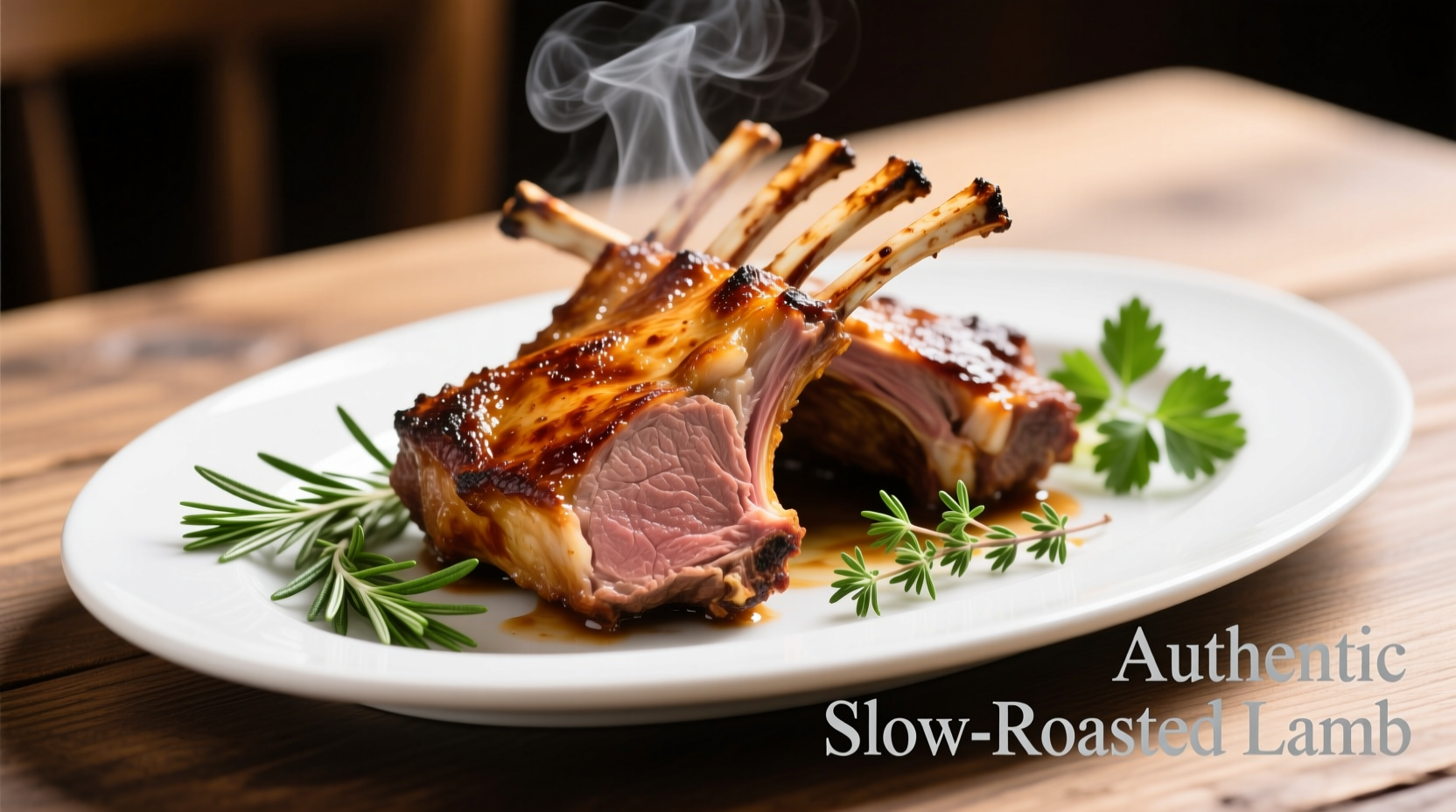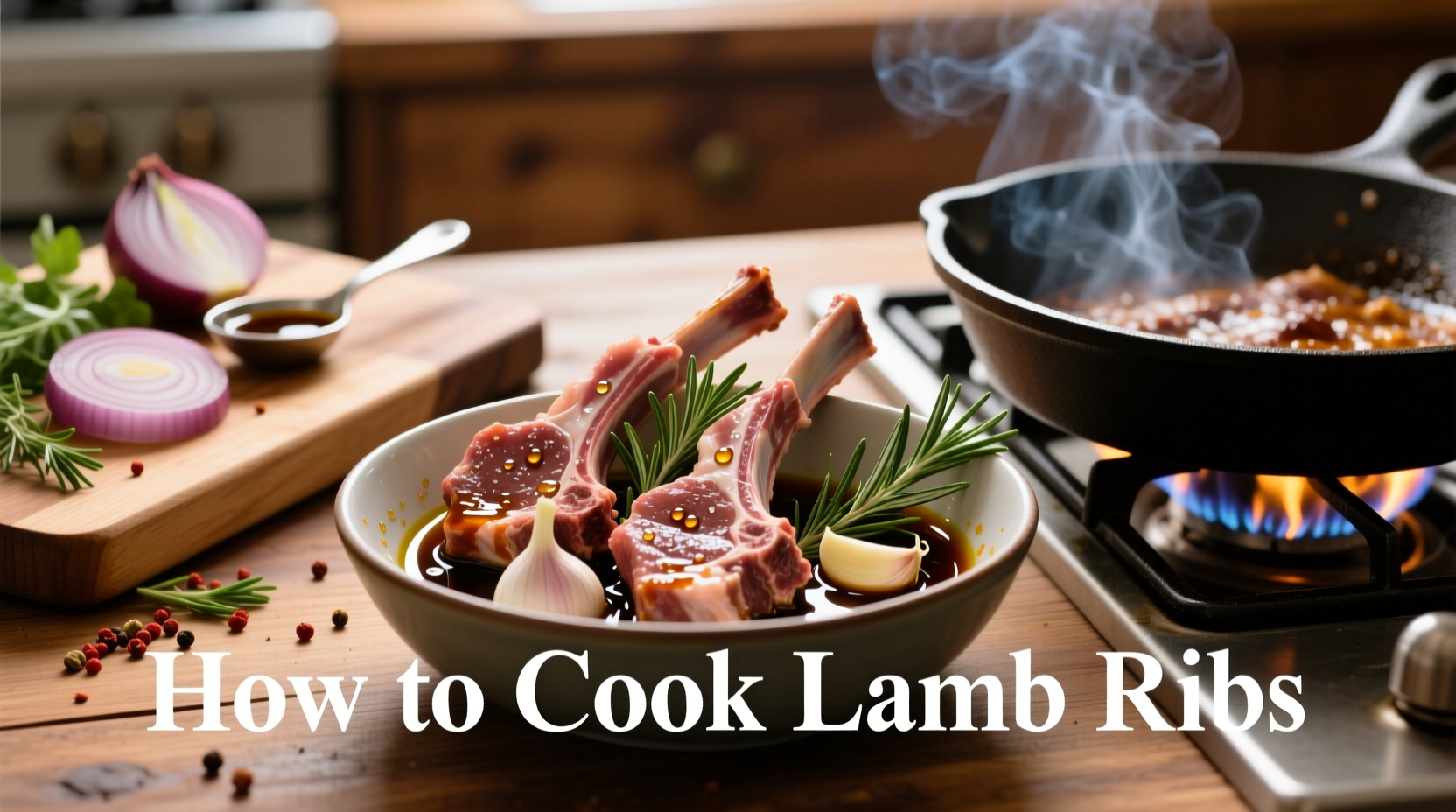Lamb ribs should be cooked low and slow at 275-300°F for 1.5-2 hours until the internal temperature reaches 145°F for medium-rare, followed by a 10-minute rest period before serving. Proper trimming, seasoning, and temperature control are essential for tender, flavorful results.
Mastering Lamb Rib Preparation: Your Path to Perfectly Cooked Ribs
Nothing compares to the rich, succulent flavor of properly cooked lamb ribs. Whether you're hosting a special dinner or simply craving gourmet comfort food, this guide delivers everything you need to transform humble lamb ribs into a show-stopping meal. You'll learn professional techniques for preparation, seasoning, and cooking that guarantee tender, flavorful results every time—no special equipment required.
Why Lamb Ribs Deserve Your Attention
Lamb ribs offer a perfect balance of meat and fat that creates incredible tenderness when cooked properly. Unlike other cuts, they cook relatively quickly while delivering that distinctive lamb flavor enthusiasts love. The key to success lies in understanding the meat's structure and applying the right cooking technique for your available equipment.
Essential Tools for Lamb Rib Success
Before you begin, gather these kitchen essentials:
- Sharp boning or chef's knife for trimming
- Meat thermometer (digital instant-read recommended)
- Baking sheet with wire rack (for oven method)
- Aluminum foil for wrapping
- Grill tongs with good grip
- Brush for applying sauces or oils
Understanding Your Lamb Ribs
Lamb ribs come in two primary configurations: dino ribs (featuring multiple bones connected in a curved section) and single ribs (individual bones separated by the butcher). Both respond well to low-and-slow cooking, but dino ribs require slightly longer cooking times due to their larger mass.
When selecting lamb ribs, look for:
- Pinkish-red meat color (avoid grayish tones)
- Marbling throughout the meat
- Fat that appears creamy white, not yellowed
- Fresh butcher date (consume within 2-3 days of purchase)
Preparation: The Foundation of Flavor
Proper preparation separates good lamb ribs from exceptional ones. Follow these steps:
Membrane Removal
The thin membrane on the bone side of the ribs can become tough during cooking. To remove it:
- Slide a butter knife under the membrane at one end
- Lift gently until you can grab it with a paper towel
- Pull firmly at a 45-degree angle to remove in one piece
Trimming Excess Fat
While some fat is desirable for flavor, excessive fat can cause flare-ups on the grill. Trim visible thick fat deposits but leave the marbling within the meat.
| Cooking Method | Temperature | Time | Internal Temp | Best For |
|---|---|---|---|---|
| Oven Roasting | 275°F | 1.5-2 hours | 145°F | Weeknight meals, precise temperature control |
| Grilling | Indirect heat 300°F | 1.5 hours | 145°F | Summer cooking, smoky flavor |
| Smoking | 225-250°F | 2-2.5 hours | 145°F | Special occasions, maximum flavor complexity |
This cooking methods comparison shows how different approaches affect your lamb rib results. According to the USDA Food Safety and Inspection Service, cooking lamb to 145°F with a 3-minute rest time ensures both safety and optimal tenderness for medium-rare preparation. USDA Cooking Temperatures Guidelines
Seasoning Strategies for Maximum Flavor
Lamb ribs have enough natural flavor that they don't require heavy seasoning, but the right blend enhances their inherent qualities:
Dry Rub Essentials
A simple dry rub works wonders:
- 2 tablespoons kosher salt
- 1 tablespoon black pepper (freshly ground)
- 1 tablespoon garlic powder
- 1 tablespoon dried rosemary
- 1 teaspoon smoked paprika
Mix ingredients thoroughly, then apply generously to all sides of the ribs. Let sit for at least 30 minutes before cooking to allow flavors to penetrate.
Marinade Options
For deeper flavor penetration, try a 2-4 hour marinade:
- 1 cup olive oil
- 4 minced garlic cloves
- 2 tablespoons lemon juice
- 1 tablespoon fresh rosemary, chopped
- 1 teaspoon Dijon mustard
The Cooking Process: Step by Step
Oven Method (Most Accessible)
- Preheat oven to 275°F
- Place ribs bone-side down on a wire rack over a baking sheet
- Cook uncovered for 90 minutes
- Check internal temperature; if not near 140°F, continue cooking
- When near target temperature, increase heat to 400°F for 5-10 minutes to crisp exterior
- Remove from oven and rest for 10 minutes before serving
Grill Method (For Smoky Flavor)
- Prepare grill for indirect cooking at 300°F
- Place ribs on cooler side of grill, bone-side down
- Cook with lid closed for 90 minutes
- Check temperature; if needed, move to direct heat for 2-3 minutes per side to crisp
- Remove and rest before serving

Doneness Indicators You Can Trust
While temperature is the most reliable indicator, these visual cues confirm proper doneness:
- Meat shrinkage: The meat will have pulled back from the bones by about 1/2 inch
- Bend test: When lifted with tongs, the ribs should bend easily and small cracks may form in the surface
- Texture: The meat should feel tender but not falling off the bone
Avoiding Common Lamb Rib Mistakes
Even experienced cooks make these errors when preparing lamb ribs:
Overcooking
Lamb ribs become dry and tough when cooked beyond 150°F. Use a reliable thermometer and check frequently during the final cooking stage.
Insufficient Resting Time
Rushing to cut into ribs immediately after cooking causes precious juices to escape. The 10-minute minimum rest allows juices to redistribute throughout the meat.
Improper Temperature Control
Fluctuating temperatures lead to uneven cooking. Whether using oven or grill, maintain consistent heat throughout the cooking process.
Serving Suggestions That Elevate Your Dish
Pair your perfectly cooked lamb ribs with these complementary sides:
- Fresh mint chimichurri sauce
- Roasted root vegetables
- Couscous with dried fruits
- Simple arugula salad with lemon vinaigrette
For wine pairings, consider medium-bodied reds like Pinot Noir or lighter Syrahs that complement rather than overwhelm the lamb's delicate flavor.
Storing and Reheating Leftovers
Store cooked lamb ribs in an airtight container in the refrigerator for up to 3 days. For best reheating results:
- Wrap in foil with a splash of broth
- Reheat in 275°F oven for 15-20 minutes
- Avoid microwave reheating which makes meat tough











 浙公网安备
33010002000092号
浙公网安备
33010002000092号 浙B2-20120091-4
浙B2-20120091-4